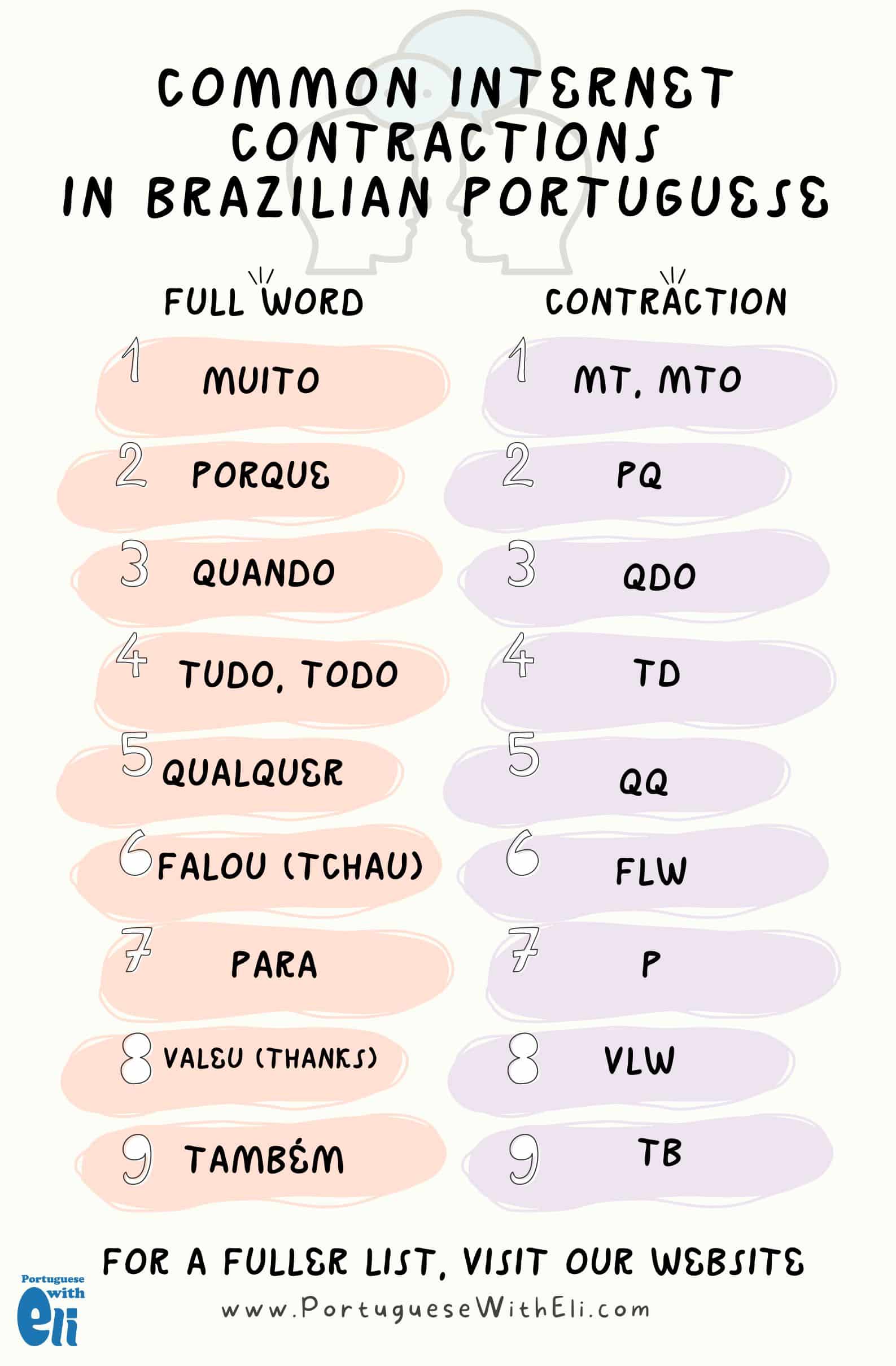15 Brazilian Portuguese Internet Slang Terms to Use in 2022

Do you remember when you first opened an email account?
I do. I was at the only computer school in my city. Other students and I followed the instructions given by our teacher to open a Gmail account. I’ve always been one to follow orders, so my email name was simple and direct.
Most of my colleagues’ names, though, were like “@nd3rs0n” and “MariInah¯\_(ツ)_/¯”.
Those funny symbols and different spellings of words started to pop up. It was a matter of time before that became a different language of its own, what we know now as Brazilian Portuguese Internet slang.
Internetês, the language of the Internet
Internetês, the Brazilian Portuguese Internet slang, has drawn attention since its inception.
Some argue it’s positive. It’s a new way to talk with your friends and express yourself. It breaks free from old, stiff rules of “how things should be done” and become a more flexible way to express ourselves.
But professionals like the late journalist Eduardo Martins don’t see Brazilian Internet slang that way. For people who share this view, learning how to spell and write is highly dependent on visual memory. Someone who is bombarded with different spellings of the same word may not be able to recall the right way to write.
For better or worse, though, Brazilian Portuguese Internet slang is something you have to learn if you want to communicate effectively online (like slang, which we talked about in this article and why learning slang is important). More so if the people you’re talking to are around the age of 30.
Some Brazilian Portuguese slang to get started
I take the risk of being remiss by giving you only fifteen Brazilian Portuguese slang terms now, but it’s by no means an exhaustive list.
I’ll update this article often, and the pointers I give you here should be enough for you to use as a springboard to continue your research—if that’s something you’d like to do, of course.
The first ten expressions you should know right now are the ones below.
Stalkear
Josh has a beautiful relationship with Anna. The problem is, Anna doesn’t know about it. But Josh keeps visiting her profiles on the Internet, checking what she does, and, sometimes, he even follows her on the street.
He means no harm, of course. He is only stalkeando (yep, it comes from the English verb “stalk,” and it means the same).
Lacrar
In Brazil, keeping a low profile is essential to guarantee your survival anywhere. Even when we should speak up (against racism or bigotry, for example), we tend to keep our mouths shut.
But some just won’t have any of it. They speak up and say it out and loud.
When their criticism is so well done, we say that “eles lacraram” (they crushed it).
The noun of this verb, “lacração”, is also used by people to criticize those who defend minorities with an inflamed speech. In this context, it has the same meaning as “woke” when used to disparage people’s behavior.
Biscoitar
Sometimes good-looking people really want attention. And they do so by posting pictures on social media with subtitles or descriptions that have nothing to do with whatever they’re doing.
And better than me explaining to you what it means, let me tell you a quick story.
In Capitólio, Minas Gerais, a rockslide killed ten tourists [in Portuguese]. And not long afterward, an influencer posted this picture to show her support for the families of those who were killed.

This seems to be an extreme case of someone wanting some cookies (biscoitando). But it’s quite common in Brazil.
Next time you see someone of themselves semi-naked, you know what verb to use.
Contatinho
It is someone who is in your phone book. But you call that person only when you have no one else to call when you want to hang out, especially when you have no romantic pair.
- A Marina é cheia dos contatinhos. Marina has a lot of contacts (she can call when she wants to hang out).
Gado
This is a way more recent word. It’s a direct translation is cattle — that’s exactly what it means. Someone who is easily manipulated, especially by far-right politicians, is gado.
This word is especially funny in this meaning in Brazil because we used to have a soap opera called “the King of Cattle.”
Pisa menos
Although the direct translation is “stomp less” (I don’t think it makes sense), it’s actually a compliment.
If someone defends their point of view with very tight logic and good arguments, especially in a way the other person, you can use this expression to compliment them on their speech.
- Eita, a Sarah falou tudo! Pisa menos, gata! Wow, Sarah said a mouthful! “Stomp less,” sweetie!
And this is the song that brought this expression about:
Oi, sumido (or its feminine counterpart, oi, Sumida)
If someone ever texts you this message, run!
We usually send this message to someone we haven’t seen for a while (a long while). It is usually someone we want something from — whether romantically or financially.
- Oi, sumida! Há quanto tempo! Tenho uma oportunidade ótima que queria te apresentar… Hey you, disappeared one! Long time no see! I have a great opportunity that I would like to show you…
Trollar
It has the same meaning as the verb “to troll” in English.
And one constant thing that you will see in Brazilian Portuguese Internet slang is that we tend to adopt English words. All we do is we slap an -ar on it and that’s it: now it’s a Portuguese word.
- Eu adoro trollar nos fóruns online. I love trolling in online forums.
Hater
when I was younger, the word we used to use at the time was inimigos. And it was used indiscriminately to talk about people we thought didn’t like us.
Now the word we use is hater. But “hater” has a broader sense in Portuguese. In this case, it means someone who is going to hate you anyway because it’s in their nature. They can’t help it.
All you can do is learn how to deal with them.
- A vida é assim: cheia de haters. Mas a gente tem que seguir em frente. Life is like this: full of haters. But we have to go on.

Ranço
Originally, this is a word we use to talk about that gooey substance that comes out of old cheese — it is viscid, weird to the touch, and bad-smelling.
But on the Internet — and offline too — we use this word to talk about the feeling of contempt and hatred we have for someone. We usually say that “someone gives us ranço” (alguém nos dá ranço).
And when we say it, we tend to give the eye-roll.
- Todo mundo acha o Pedro um cara simpático, mas ele me dá ranço. Everyone thanks Peter is a nice fellow, but he makes me feel contempt.
Partiu
This is one of those Brazilian Portuguese slang terms that has come into everyday language.
Originally, it would be used with a hashtag to say “off to someplace,” usually some good place.
- #Partiu Praia! (off to the beach).
Now we use it with the sense of “let’s go.”
- Tou indo na praia. Partiu? I’m going to the beach. Are you coming with me?
Militante
Again, this is another word originally used in the political realm that has come to the Internet and then gone into everyday language.
Differently from a militant of a party, the person we referred to as “militante” has a combative, belligerent behavior toward what they perceive as bigotry. Sometimes they have an exaggeratedly heightened sense of justice. So much so that we have come up with the expression “descansa, militante” (relax, militant) to tell someone to calm down when they are too worked up about something social.
More niche selections of Brazilian Portuguese slang to show your language prowess
As I said, creating a list of slang terms used online is a futile endeavor. Mainly because Brazilians create new terms and drop old ones at the drop of a hat.
But I include in this extra section a few terms I’ve seen more widely used online, but in highly specific situations.
Fanfic
This one reminds me of the story of a woman and her five-year-old son. They were walking downtown and went past a beggar. She told her son to walk faster, then her son stopped and said, “mom, don’t you see a man in need is here? I heard my teacher saying we should never pretend people don’t exist—it’s both an insult and cowardice.” And the woman cried, ashamed.
It doesn’t mean this story isn’t true. It’s just too perfect to sound true. Then Brazilians say it’s “uma fanfic”.
A good source of fanfics to laugh about is the Facebook page “Fanfics Corporativas.” It’s a good reading exercise to practice your Portuguese.
- Toda segunda-feira, meu chefe conta alguma fanfic motivacional. Every Monday, my boss tells some motivational “fanfic.”
Tankar
This verb comes from the English word “tank.” If someone does something and you can’t help but laugh, even though you try not to, it means you can’t “tankar”.
- Ah, eu não tou tankando essa! I can’t with it!
Dar ruim
When someone doesn’t turn out the way we expected, and usually it’s a bad result, we say “deu ruim.”
- Fui me bronzear na praia, mas deu ruim. Acabei ficando toda queimada. I went to the beach to get a tan, but I botched it. I ended up all sunburnt.
How about the Brazilian Portuguese contractions used on the Internet?
We are mostly typing on the phone when we write every day online. And it’s a pain to spell a word out. That’s why we have contractions. And in this section, you will find an easy reference guide to the most common contractions.
Video lesson:
And this easy reference infographic will help you a lot.

But I also prepared this as a reference for you to download. It’s a more complete list you can print out and take along with you anywhere.
Wrapping up
It may seem a little bit late to come to this conclusion, but Brazilian Portuguese Internet slang is here to stay.
Even people who don’t regularly write or say those words need to know what they mean. Otherwise, they will be left out.
And the best way to keep in the loop is by exposing yourself to the language.
Join Facebook groups where Brazilians hang out. Download WhatsApp now. Comment on YouTube videos where speakers are Brazilians.
The more you do, the more you learn.
And share with us in the comments section: what is your favorite Internet slang so far?






